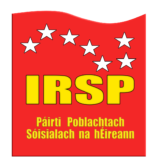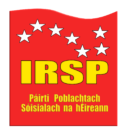In recognition of the 30th anniversary of the end of the miner’s struggle against Thatcher, in which those involved fought a hard battle to the bitter end, in defence of their jobs, families and hard built social structure, the Irish Republican Socialist Movement were delighted and honoured to host a visit to Ireland this weekend from comrades who played a central role in that fight, from the Hatfield Colliery picket line and as participants in often brutal mobilised actions at coal fields, towns and villages across England.

Dave Nixon, David Douglass and Leslie Moore were all politically grounded workers and members of the National Union of Mineworkers; involved in other successful strike actions since the late 70s, they foretold the oncoming attacks from the Thatcher government in the run up to the 84 strike and recognised that the Tory hatred for organised Labour in England, Wales and Scotland would herald an attempt to destroy the coal industry, under the guise of making it appear unprofitable. When the time came to strike, the Hatfield Colliery under the watch of the NUM was ready, and throughout the period proved to be the most militant of all areas involved in the fight. Their personal stories and reflections of the period were covered in the BBC Documentary ‘The Miners Strike’ which was made to mark the 20th Anniversary. https://www.youtube.com/watch?v=NPjWgzAEzwI
The Banner
The delegation were also responsible for restoring the internationally iconic Follonsby-Wardley ‘Connolly/Lennin’ banner which was commissioned by the miners in 1928 yet destroyed in later years, due most likely to a malicious fire. After years of determined research, fundraising and lobbying, the Follonsby/Wardley banner was restored at a cost of around £13’000, to date it is the only trade union banner which depicts ICA Commander James Connelly in full military attire.

The delegation had travelled by car from Northern England to Stranraer on Thursday night, staying in a guesthouse before catching the boat to Belfast on Friday morning. On arrival in Belfast, the delegation we met at the docks before they made their way to Costello House; Headquarters of the party of Connelly, where they were warmly greeted by comrades and workers at the building. Making the most of the good weather, their Iconic banner was unfurled in the Sunlight and a small lecture on the banners history was given by Dave Douglass who has written books not only on the 84-85 strike, but on the banner itself. The discussion was well received and welcomed by both comrades and passing members of the public and motorists, some of whom came in to enquire more about the presence of this novel object on the Falls Road on a Friday afternoon.
Derry
Later that evening, the delegation made their way to Derry City, where comrades from the James Connelly Youth movement had secured a venue at the City Hotel for a lecture on the 84-85’ strike. In what was to become a very moving discussion, those present heard from the miners themselves on how many thousands of English workers’ understanding of what the people of Ireland were going through at the time (at the hands of British imperialism) was very much shaped by the plethora of oppressive tactics and dirty tricks which were used against the miners themselves, by the Police and MI5, who utilised all underhanded means at their disposal; including collective community punishment, wrongful arrest and conviction, frame-ups, spying and murder in order to try destroy a formidable peoples movement.

Following an in depth Questions & Answers session, which touched upon topics as diverse as ‘the next arena for class struggle’ to the ‘potential for a return to coal as a general source of energy’, the meeting was addressed by two currently striking Glasgow Homeless case workers. Homeless workers Suzanne and Jennifer spoke on how they have been out on strike for the past five weeks, an ‘unofficial and indefinite strike’ their struggle is based around gaining official recognition of the work that they do, a reaction to staff bullying and an end to exploitative work conditions and unacceptable workloads. A small collection was also conducted on their behalf.

Back to Belfast
After a late trip back to Belfast, the next day the Miners delegation formed up in the rain to join with comrades from the IRSP to take part in the annual Mayday rally in the city. Some good press coverage of this and a follow up lecture at the ‘Belfast Unemployed Resource Centre’ had created a bit of a buzz at the event, yet the arrival of the Yorkshire miners and their iconic banner was marred by appalling conditions, rain and wind meant that the Follonsby-Wardley banner had to be covered by a heavy plastic wind sheet which made it much harder to handle and called for some Irish support several Belfast comrades got their first taste of windy banner techniques as they were required to literally ‘take the ropes’ in gale force conditions through Belfast city centre.

Legion of the rearguard at the Belfast Mayday march
As is unofficial tradition within the Belfast Mayday march, Republican and other revolutionary organisations form up at the rear of the procession. Yet as a result of the buzz created around Newspaper stories in the run up to the march, the delegations arrival had been noted by the Trade Union movement and upon forming up the visitors were understandably invited by March organisers to take themselves and their banner to the front and lead the rally. However the miners politely declined this invitation, stating plainly that ‘we came with these people [IRSP] we’ll march with them’. Although they would have been thought no less of if they had taken the up the organiser’s invitation, the decision of the miners to stay behind with Republican Socialist comrades was noted as typical of their grass roots spirit and complete lack of pretence.
The Hatfield miners who fought the might of the Thatcher government in 1984-85 walked in the rain at the back of the Belfast march with Republican Socialists, it was a hard walk with rain and wind making the heavy banner hard to negotiate and at times making it more akin to a sail than a banner, nevertheless they persevered with help from Irish Comrades made it to the end.
Standing room only
Immediately following the march, it was standing room only at the Belfast Unemployed Resource Centre, were again David Douglass gave a moving breakdown of the political conditions which led to the Strike, the appalling poverty and living standards endured by striking miners and their families at the time and as always the draconian conditions applied to them by the corrupt British state as well as the virtually unspoken of yet [then] real possibility of mining communities being forced to mobilise against the British army had Thatcher seen fit to send in the troops, which appeared more than likely in 1984.

Moving contributions were also made from the floor from others who had been in England at the time of the strike and who had participated in struggle on the streets. The meeting ended with Dave Douglass giving his analysis of the layout of the Follonsby-Wardly banner itself, and how it represented every tradition within the left, the Social-democratic, Syndicalism and revolutionary Socialism. Describing how all those depicted in the banner were related through struggle, he spoke of the link between reform and revolution, describing the IWW tactic of ‘fighting for more bread this side of the revolution, and the whole damn bakery afterwards’.
As predicted the visit of the miners to Belfast and Derry for anniversary Mayday lectures was an immense success and both helped to educate and raise the morale of comrades on both sides of the Irish sea, for that alone the effort was worth it. Many took the opportunity of paying tribute to these class fighters later on in the day, in bars and at left wing Mayday functions at which they were both warmly welcomed and invited to sing, which they did.

All in all a great weekend of events was had and comradely contacts made for the future. The IRSP, Teach na Failte and the Republican Socialist Movement thanks our English comrades for the efforts they made on our behalf.



